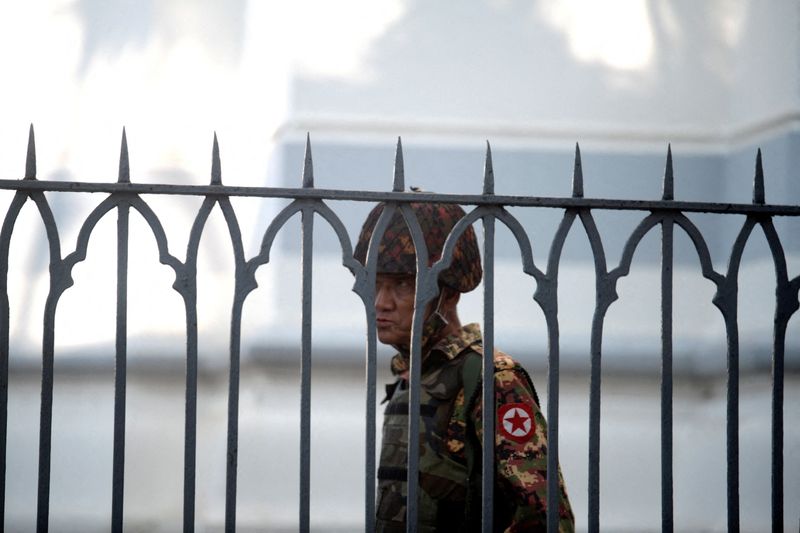(Reuters) - Myanmar's military has struggled to consolidate power in the year since it took back control of the country by force and embarked on a sweeping crackdown against opponents to its rule.
Conflicts have reignited between armed groups and the Tatmadaw, as the military is known, while the economy has taken a big hit. The international community has sought to isolate the military government through sanctions and coordinated pressure, but there is no indication the generals will give way.
WHO IS INVOLVED IN THE POLITICAL CONFLICT?
The junta says it is fighting "terrorists" allied with the ousted government and has accused them of foreign-backed economic sabotage.
A National Unity Government (NUG), a parallel administration comprised of deposed legislators and ruling party members has called for a people's uprising against the Tatmadaw.
From exile, the NUG has sought to garner international support and be recognised as Myanmar's legitimate authority and is demanding inclusion in any peace process. The NUG is also fundraising, including via the sale of zero-interest bonds.
WHO IS THE MILITARY FIGHTING?
So-called "people's defence forces" - civilians with rudimentary weapons and limited training - have popped up in many regions of the country to challenge the junta.
The militias have attacked the well-equipped army, which has been accused of responding with excessive force, including shelling and air strikes in civilian areas, causing massive displacement.
Some activists have accused troops in some cases of atrocities, including mass killings, burning villages or executing suspected militias or their informants. The junta has rejected the allegations as falsehoods.
The coup has revived bitter enmities between the Tatmadaw and some ethnic minority armies, such as the Kachin Independence Army and the Karen National Union, which fought the military for decades. Some rebels have declared their support for the NUG and helped train https://reut.rs/3Hi9JeA its militias.
WHAT HAS THE IMPACT BEEN?
At least 1,500 civilians have been killed and 11,787 wrongly detained for anti-junta protests, according to the United Nations. The junta has previously dismissed similar numbers from rights groups at exaggerated.
An estimated 320,000 people have been displaced in Myanmar, and the U.N. humanitarian agency says it needs to reach 6.2 million people in urgent need of help.
Refugees have fled fighting in Chin State, the Sagaing region and Kayah and Karen states, heading into camps in neighboring India and Thailand.
WHAT IS LIFE LIKE IN MYANMAR?
Though the situation has stabilised somewhat, the coup has set Myanmar back significantly. Key sectors including health and education have been badly affected and public and commercial services have been disrupted. Power outages are more frequent and internet shutdowns have hampered businesses.
Small businesses have closed or struggled from revenue losses from the economic fallout and a lack of credit access. The kyat currency's depreciation https://reut.rs/2WP7BJi last year has driven up costs and disrupted supplies. Huge job losses have ensued, especially in construction.
The World Bank says Myanmar's economy is showing signs of recovery in exports and manufacturing, but remains critically weak https://reut.rs/3GfwE90 and 30% smaller as a direct result of the coup. It has forecast an 18% contraction for the 2021-2022 fiscal year.
IS THERE A SOLUTION TO THE CRISIS?
Though the junta is struggling to govern and coming under intense international pressure, it has shown no interest in negotiating or veering from its plan to impose order and hold an election on its terms.
A internationally backed diplomatic effort by the Association of Southeast Asian Nations (ASEAN) based on a five-point peace "consensus" agreed nine months ago has faltered, with prominent members accusing the junta of ignoring it.
ASEAN barred the generals from meetings since October and says military chief Min Aung Hlaing has shown no sincerity towards ending hostilities and allowing an ASEAN envoy to meet all stakeholders and resolve the crisis.
Western countries have imposed sanctions on the military and its lucrative conglomerates and called for a ban on arms sales to Myanmar. Many multinational firms are retreating, most notably from the energy sector, a vital revenue source for the generals.
HOW IS THE JUNTA RESPONDING?
The Tatmadaw has acknowledged international pressure, but has vowed not to give in to it.

It has accused ASEAN of departing from its non-interference policy and of being swayed by Western powers and criticised the U.N. and its envoys of bias and interference and relying on "distorted news".
Despite demands to release deposed civilian leader Aung San Suu Kyi, the junta has charged her with more offences https://reut.rs/3uc4zgv and is standing by its own five-step roadmap to democracy, which has no international endorsement.